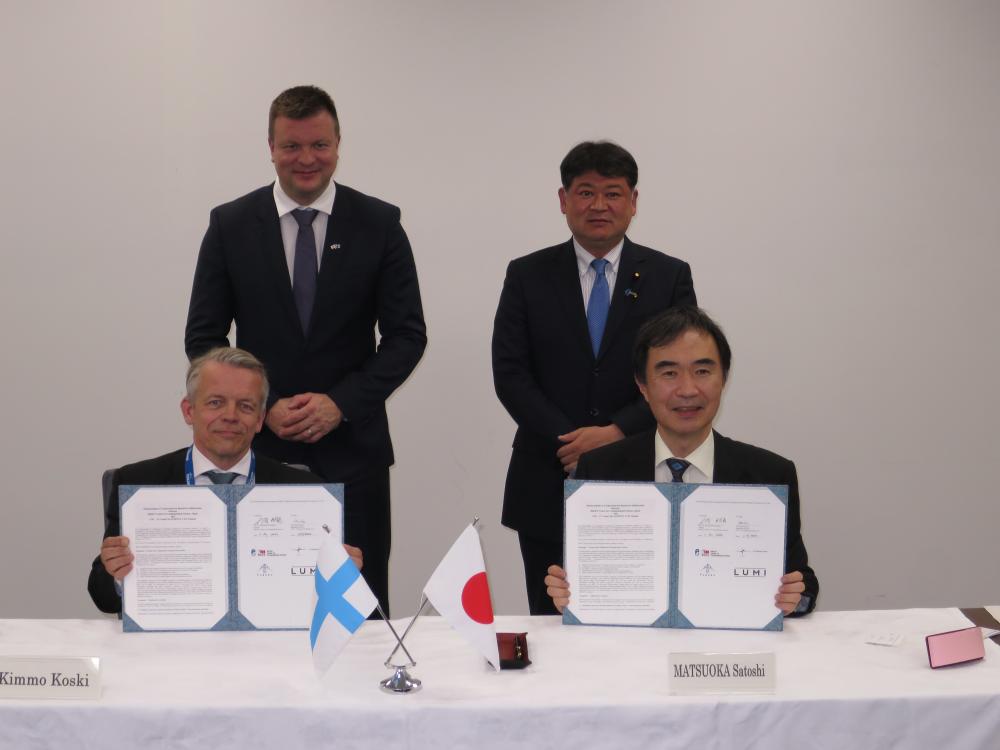CSC and RIKEN Center for Computational Science to engage in closer cooperation involving supercomputers
CSC has signed a Memorandum of Cooperation (MoC) with Japan’s RIKEN Center for Computational Science (R-CCS). The upcoming cooperation will promote international cutting-edge research by enabling Finnish and Japanese researchers utilize more efficient computational tools for their collaborative efforts than ever before. The signing event was held on 11 May in connection with the Societal Impacts of Digitalization seminar.
R-CCS has developed and manages Fugaku, Japan’s national flagship supercomputer located in Kobe, Japan, which is listed as the fastest in the world in major supercomputer rankings. CSC, meanwhile, is responsible for Finland’s HPC and data infrastructure. CSC is also the host for LUMI, Europe’s most efficient pre-exascale supercomputer. The agreement that was reached, opens new doors to international research collaboration for Finnish and Japanese researchers.

Signing of the MoC, in the front row Kimmo Koski, Managing Director of CSC and Satoshi Matsuoka, Director, RIKEN Center for Computational Science. On the back, Ville Skinnari, Minister for Development Cooperation and Foreign Trade and Hideyuki TANAKA, Vice-Minister.
Individual research groups cannot solve complex global research challenges alone, as they require cooperation among numerous research communities and the capacity to both combine and to handle vast amounts of data from different fields of research. For example, research for understanding and tackling climate change, and promoting green transition, require research methods that call for next generation computational capacity and extensive, cross-disciplinary cooperation among international research groups. An increasingly important part of this cooperation involves digital infrastructures and skills in technology and individual fields of research connected with their use and development.
– The cooperative agreement that has now been reached combines the resources of two major supercomputers of the world and the skills and knowledge required for managing them. Through their cooperation CSC and R-CCS will be able to offer some of the world’s most efficient tools for researchers. This gives Finnish research a significant competitive advantage, while contributing to the building of bridges between European and Japanese research communities, says CSC Managing Director Kimmo Koski.
– The MoC is a delight as well as a fantastic opportunity for both Finnish and Japanese researchers to collaborate, regarding the improvement of the advanced IT centered around supercomputing technologies, as well as multitudes of research fields driven by game-changing applications that would run on world-leading machines, Lumi and Fugaku, to fulfill societal development goals. As both machines are architecturally very different while providing similar computing capabilities, comparisons of both platforms as well as development of software that run across the machines efficiently, will pave the way for significant advances of the supercomputing field, notes Satoshi Matsuoka, the Director of R-CCS.
CSC has established networks with several other international stakeholders, with corresponding cooperative agreements.
– We will continue building our international collaboration network also into the future, Kimmo Koski states.
Further information, please contact:
CSC – IT Center for Science Ltd.
Managing Director Kimmo Koski
Tel. +358 50 381 9777
kimmo.koski@csc.fi
RIKEN Center for Computational Science (R-CCS)
Koushi NITTA
Director, Computational Science Promotion Office
r-ccs-koho@ml.riken.jp
